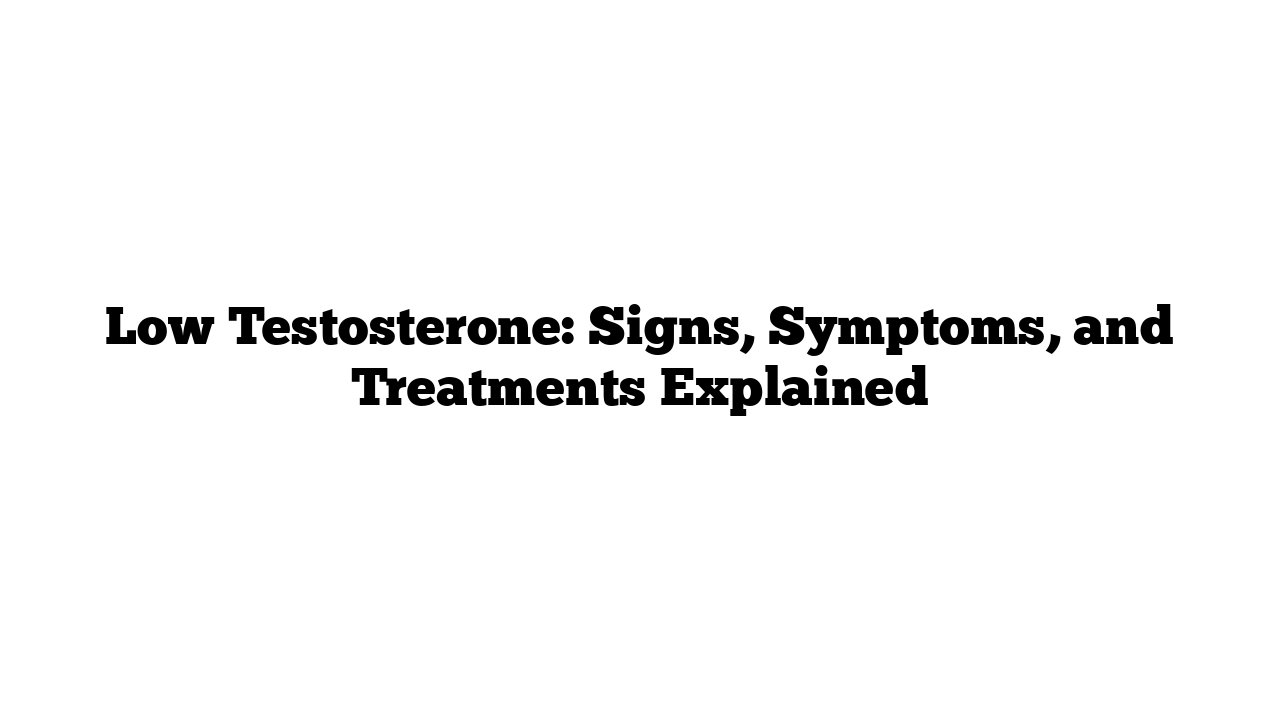Testosterone often conjures images of muscle-building, stereotypical masculinity, and energy. However, this vital hormone is far more complex and plays a crucial role in overall health.
For men, understanding the signs of low testosterone (T) and how to address it can significantly improve quality of life.
What is Testosterone?
Testosterone is the primary male sex hormone and an anabolic steroid responsible for various bodily functions. In men, it supports:
- Development of reproductive tissues like the testes and prostate.
- Secondary sexual characteristics, such as increased muscle and bone mass, body hair, and voice deepening during puberty.
Women also produce testosterone, though in much smaller amounts.
Production peaks during adolescence and early adulthood but gradually declines after age 30, dropping about 1% annually. This natural decrease can lead to various health challenges.
How Does Testosterone Work?
The brain and pituitary gland regulate testosterone production. Signals from the brain prompt the pituitary gland to instruct the testes to produce testosterone. When levels are too high, feedback mechanisms reduce production to maintain balance.
Signs of Low Testosterone
Recognizing low testosterone is vital. Here are 10 signs to watch for:
- Sex Drive Dips: A noticeable decline in libido.
- Erectile Challenges: Difficulty achieving or maintaining erections due to insufficient testosterone stimulation of nitric oxide production.
- Low Semen Volume: Reduced production of the fluid essential for sperm motility.
- Hair Loss: Thinning of scalp, facial, or body hair due to decreased testosterone levels.
- Fatigue: Persistent tiredness despite adequate sleep.
- Loss of Muscle Mass: Declines in muscle strength and size.
- Increased Body Fat: Hormonal imbalances can cause gynecomastia (enlarged breast tissue) and fat accumulation.
- Decreased Bone Mass: Greater risk of fractures and osteoporosis.
- Mood Swings and Mental Fog: Depression, irritability, and reduced cognitive function may signal hormonal imbalance.
- Low Blood Counts: Associated with anemia, which can cause dizziness, abnormal heart rate, and sleep disturbances.
Causes of Low Testosterone
While aging is a natural cause, other factors include:
- Injuries or Disorders: Testicular injuries, pituitary gland disorders.
- Medical Conditions: HIV/AIDS, inflammatory diseases like sarcoidosis, and tuberculosis.
- Cancer Treatments: Radiation or chemotherapy can impair testosterone production.
- Testicular Tumors: Often linked to reduced hormone levels.
Untreated low testosterone can lead to hypogonadism, a condition associated with infertility, osteoporosis, and reduced physical strength.
Testosterone Replacement Therapy (TRT)
TRT is a common treatment for low testosterone and hypogonadism. It’s administered via gels, injections, patches, or implants. While effective, TRT carries risks:
- Short-Term Side Effects: Acne, sleep apnea, testicular shrinkage.
- Long-Term Risks: Cardiovascular issues, prostate cancer concerns.
Always consult a healthcare provider for personalized advice.
Natural Ways to Boost Testosterone
For those seeking non-pharmaceutical solutions, lifestyle changes can help:
- Zinc: Essential for testosterone regulation. Found in shellfish, whole grains, and supplements.
- Potassium: Aids in testosterone synthesis. Add bananas, spinach, and beets to your diet.
- Healthy Lifestyle: Regular exercise, adequate sleep, and stress management can naturally boost hormone levels.
Why Testosterone Matters
Testosterone’s influence extends beyond muscle-building. It’s a critical player in mental health, energy levels, and even disease prevention. Low testosterone doesn’t just affect physical health—it impacts relationships, self-esteem, and overall well-being.
Reference Websites:
Top 10 Frequently Asked Questions (FAQs)
1. What are the main symptoms of low testosterone?
Low libido, fatigue, hair loss, and mood changes are common signs.
2. At what age do testosterone levels typically decline?
Levels begin to drop around age 30, decreasing approximately 1% yearly.
3. Is testosterone therapy safe for everyone?
TRT is generally safe when prescribed by a doctor but carries risks like cardiovascular issues.
4. Can women have low testosterone?
Yes, though it’s less common, women can experience symptoms like low libido and fatigue.
5. Are natural remedies effective for boosting testosterone?
Yes, lifestyle changes, zinc, and potassium can help improve levels naturally.
6. Does low testosterone cause weight gain?
Yes, hormonal imbalances can lead to increased body fat.
7. Can low testosterone affect mental health?
Yes, it can lead to depression, irritability, and reduced focus.
8. Is hair loss always due to low testosterone?
No, genetics and aging also play significant roles in hair loss.
9. How is low testosterone diagnosed?
Through a combination of symptoms and blood tests measuring hormone levels.
10. Can diet influence testosterone levels?
Yes, zinc and potassium-rich foods can support healthy hormone production.
